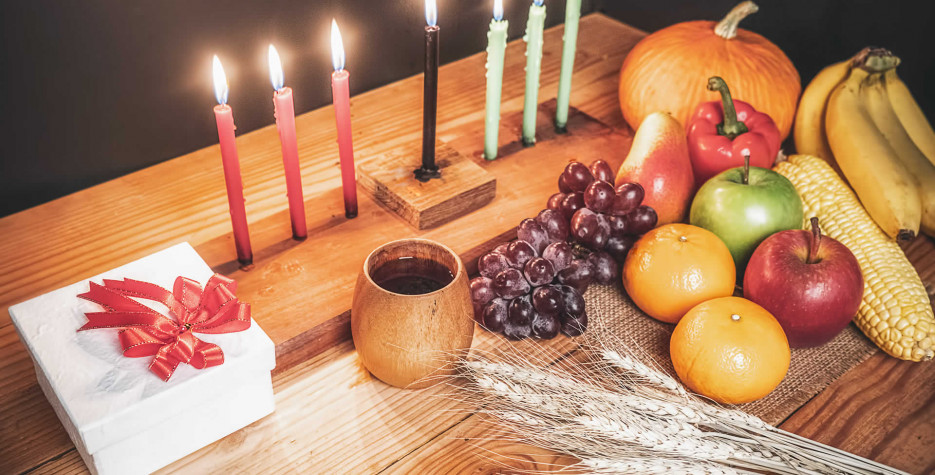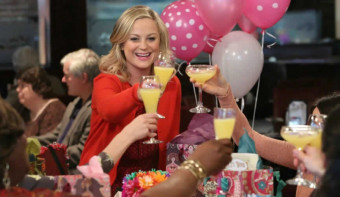About Kwanzaa
Kwanzaa is an annual holiday affirming African family and social values. It is celebrated primarily in the United States from December 26th to January 1st.
During the festival, families and friends gather together and exchange gifts. People also light a series of black, red, and green candles, which are symbols of the seven basic values of African American family life — unity, self-determination, collective work and responsibility, cooperative economics, purpose, creativity, and faith.
It culminates in gift-giving and a feast of faith, called Karamu Ya Imani. It was created by Maulana Karenga, a professor of Africana studies at California State University in Long Beach and an important figure in Afrocentrism. It was first celebrated in 1966.
Kwanzaa offers a chance to showcase and celebrate traditional African clothing, decorations, music, and dance, and includes candle-lighting and gift-giving. While the winter holiday is often overshadowed by Christmas and Hanukkah, it still has a strong following in the U.S. and in countries throughout the world.
Though information on the exact number of people who celebrate Kwanzaa is scant, some surveys have claimed that anywhere from 3 to 5 million Americans observe the holiday, with the vast majority of celebrants identifying as Black or African-American.
The official Kwanzaa website explains that Kwanzaa is modeled on African first fruits celebrations, like Umkhosi of Zululand, which has seven days. But the primary reason for the holiday being seven days is to honor the Nguzo Saba, which are the seven principles of Kwanzaa.
Kwanzaa Facts
- Kwanzaa's name is derived from the Swahili phrase 'Matunda ya Kwanzaa' which translates to 'first fruits of the harvest'.
- Kwanzaa is represented by three colors - red, green, and black.
- The Kwanzaa color red symbolizes the bloodshed in the African people's struggle for freedom.
- The Kwanzaa color green symbolizes Africa's fertile land.
- The Kwanzaa color black symbolizes the people.
- Kwanzaa has seven principles called Nguzo Saba. These include Umoja, Kujichagulia, Ujima, Ujamaa, Nia, Kuumba, and Imani.
- Umoja is the principle of unity - in the family and in the community.
- Kujichagulia is the principle of self-determination - responsibility in one's community as well as speaking for onself.
- Ujima is the principle of responsibility and collective work - building and maintaining one's community.
- Ujamaa is the principle of cooperative economics - building and maintaining businesses.
- Nia is the principle of purpose - developing and building goals that will benefit the community's people.
- Kuumba is the principle of creativity - making a more beneficial and beautiful community for future generations.
- Imani is the principle of faith - believing in the community's leaders, teachers, parents, and people.
- Kwanzaa is seven days long and on each day a candle is lit and one of the seven principles are discussed.
- The candle holder of Kwanzaa is called a kinara. It has a black candle in the middle with three green candles on the left and three red candles on the right.
- Kwanzaa has seven symbols including Mazao, Mkeka, Vibunzi, Mishumoa Saba, Kinara, Kikombe Cha Umoja, and Zawadi.
- Mazao is the symbol for vegetables, nuts, and fruits, to remind people of the harvest that fed and nourished Africa's people.
- The Mkeka is a mat where the symbols of Kwanzaa are placed upon. It is often made of African cloth or straw.
- The Vibunzi is an ear of corn, meant to represent fertility with one ear of corn placed on the Mkeka for every child in the family.
- Mishumoa Saba is name for the seven candles of Kwanzaa representing the seven principles.
- The Kinara is the candleholder that holds the seven candles of Kwanzaa, meant to symbolize corn branching off, similar to family branching off to form new family units.
- The Kikombe Cha Umoja is a unity cup that people drink from to honor ancestors.
- The Zawadi are the gifts that are given on January 1st - the last day of Kwanzaa. Gifts given on this day should encourage self-determination, growth, success, and achievement for the person receiving the gifts.
Similar Observances
Falling Needles Family Fest Day
Read More
Galentines Day
Read More
Other Observances on December 26th 2026
Boxing Day 🎁
Read More
National Candy Cane Day
Read More
National Whiner’s Day
Read More










